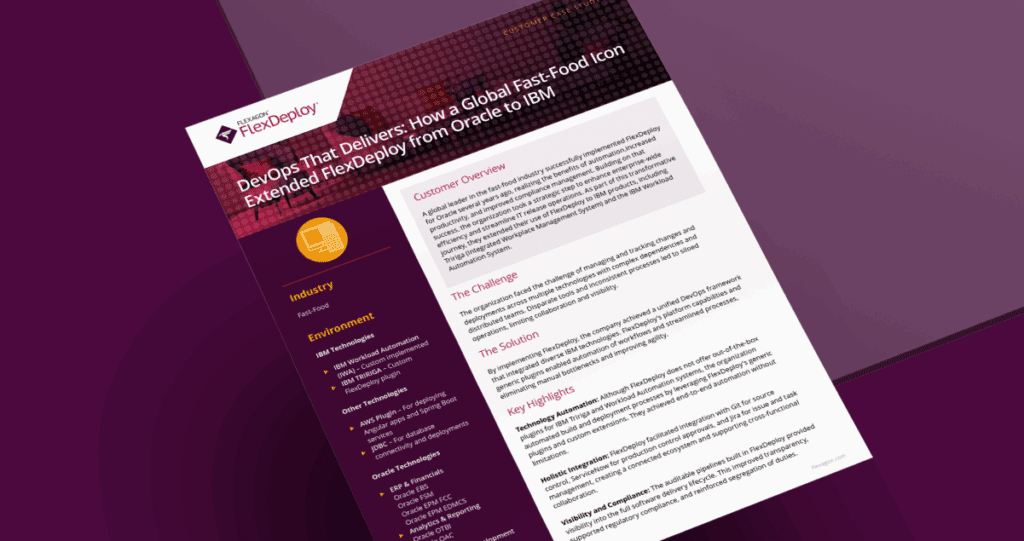Oracle’s E-Business Suite is a significant investment for businesses, not just in the initial implementation, but in ongoing customizations and upgrades. The system’s built-in features are only the beginning, with many businesses customizing EBS to fit their processes and needs.
Unfortunately, deploying the EBS customizations (e.g. PLSQL, Java, Forms, Reports) into different environments can be resource intensive and error prone due to manual and often complex, processes. The good news is that there are a few third-party development and DevOps tools specialized to work with Oracle EBS and alleviate such concerns. These Oracle EBS development tools help IT teams meet the specific needs of your business while improving the team’s performance and effectiveness.
Common Issues Oracle EBS Development Tools Help Solve
Third-party Oracle EBS development tools, often falling under the category of DevOps software or DevOps tools, help improve the deployment process, solving several common issues.
1. The Shortage of Time and Resources
Traditional Oracle EBS development and customization processes are heavily scripted and/or involve a high volume of manual tasks. As a result, projects require longer cycles and large-scale teams to support them. That also opens the process up for errors, which can extend project cycles and lead to lower software quality.
In a market that’s consistently emphasizing “continuous”, time and resources are in short supply and can significantly impact your company’s competitive position.
To overcome these issues, IT teams leverage DevOps tools with EBS-specific support. DevOps tools enable modern methodologies such as CI/CD that shorten the software delivery lifecycle, while EBS plugins automate repeatable processes, streamlining development and release. Automation also reduces manual tasks, helping cut down on errors so teams can deliver higher quality software to market.
2. Disconnected Test and Production Environments
Despite best efforts, test environments don’t always match production environments. As a result, software that functioned well during testing may experience issues when moved to production. This can translate into errors and outages that frustrate developers and end users. Prolonged outages may also increase costs for the company.
Oracle EBS development tools help ensure consistency between environments, so enhancements and customizations applied in the test environment transition smoothly to production environments. Not only are frustrations (and sometimes negative financial and customer satisfaction impact) avoided, but teams save time getting enhancements to end users.
3. Database Migration Issues
Oracle migrations, especially database migrations, come with a unique set of challenges. For example, if a migration is unsuccessful, backing out to the last known state can be difficult. Data can be lost when migrating table or column changes. Lost data must be restored from a backup or manually recreated, extending project timelines and placing more work on IT teams. Manual processes increase the occurrence of errors, slowing down project timelines.
Oracle EBS development tools have built-in features that provide solutions to those challenges. They can provide a database baseline, including structures for the schema, so you can easily roll back to the previous database structures in the event of deployment issues. DevOps tools automate processes without ongoing effort. One example is running static code analysis on the sql code at build time to verify that it meets company standards and is compatible with future versions.
A second value-add is that DevOps tools can chain steps and processes together. With EBS databases, this often includes compiling invalid objects proactively following database deployment. This eliminates rounds of testing and repeated manual effort. By investing in development tools, businesses can help their IT teams avoid these common frustrations and improve the speed, quality, and visibility of database-related changes.
4. Lengthy, Expensive Upgrade Processes
Full EBS upgrades are even more time and resource intensive than ongoing customizations. They can take months and significant financial investment, but they’re also necessary for businesses to modernize their systems and remain competitive. Upgrading from EBS 12.1.3 to R12.2, for instance, is a common goal for many organizations. Migrating existing system customizations and enhancements to R12.2, however, is a challenge.
Along with the current version of your system, Oracle EBS development tools help companies support upgrades and improve the modernization process. The best third-party EBS development tools support upgrades as well as the new processes and procedures they use, such as ADOP patching. They can also help migrate customizations and data to the cloud when your business is ready.
Third-party tools can improve upgrade processes and efficiency, but it’s important to note that they’re not a silver bullet. Upgrades, particularly full upgrades from one EBS version to another, still require business investment and dedicated resources in terms of time and IT staff.
The Business Value of Oracle EBS Development Tools
While your IT team will be the ones using Oracle EBS development tools and DevOps software, the best tools are designed with business results in mind. By improving the performance and process of deploying, migrating, and upgrading your system, Oracle EBS development tools shorten the software delivery lifecycle, automate manual processes, and reduce errors. For businesses, that translates into higher quality software releases that are delivered faster and more frequently.



